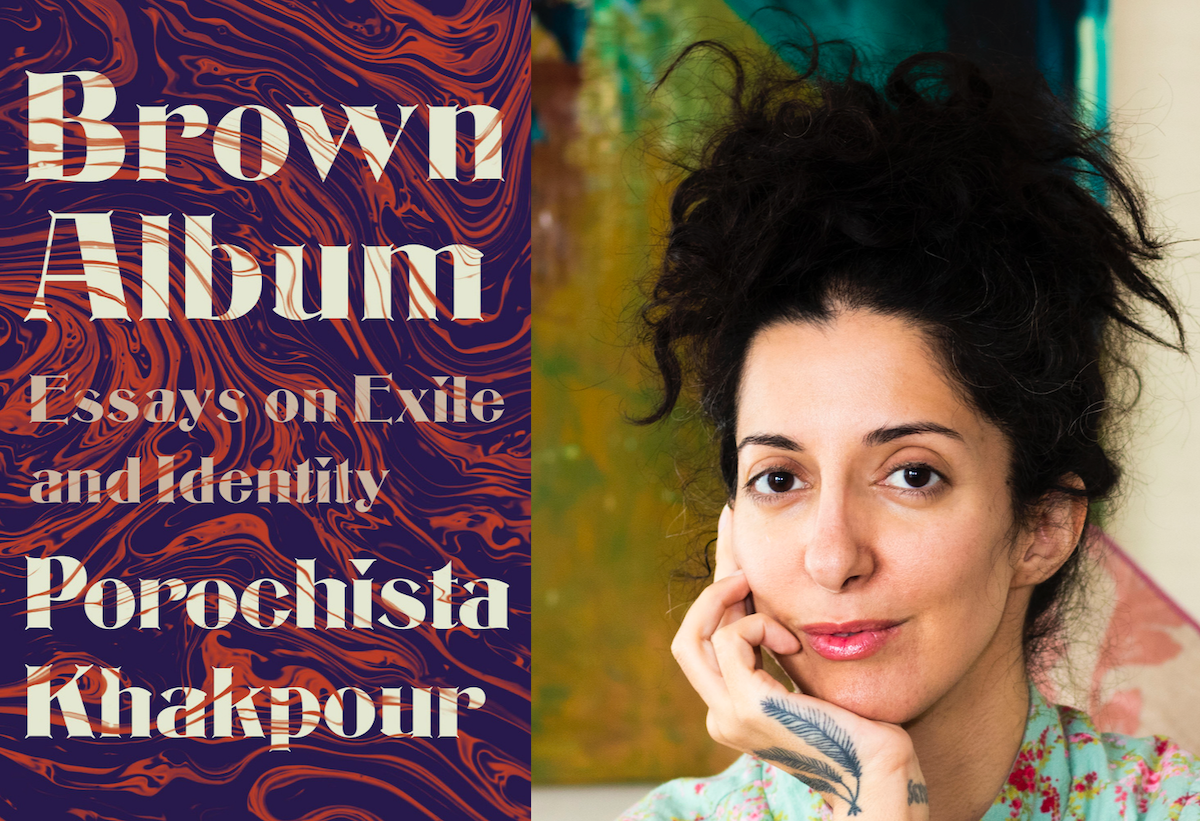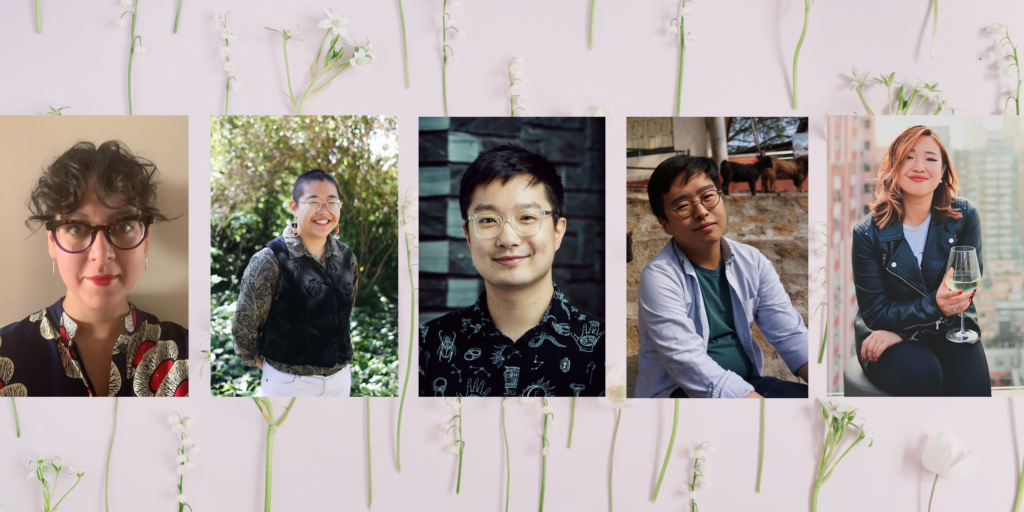The author of the essay collection Brown Album on living in New York and searching for identity in exile during the worldwide pandemic.

July 1, 2020
“Life is really intense right now,” says Porochista Khakpour, speaking from her home in Forest Hills, Queens. “I‘ve just gotten used to the sound of sirens twenty-four-seven. It’s pretty rare not to hear a siren for an hour or two.”
It’s early May and New York City, one of the epicenters of the global pandemic, is in lockdown. Khakpour’s neighborhood is just blocks away from hard-hit Elmhurst Hospital. During the time of our Skype conversation, I hear the sirens of ambulances pass by twice.
Because of Khakpour’s compromised immune system, many common quarantine safeguards are second nature to her. She’s worn masks on subways for years, and has always had groceries delivered because her body is incapable of carrying heavy loads.
Her battle with late-stage Lyme disease and other health problems are documented in her 2018 memoir Sick, which The New Yorker commended for drawing attention “to the ways in which women are expected to tell stories of sickness.”
“I felt like there weren’t enough memoirs about illness that were about women of color—they were all white women’s narratives,” she says. “When the book came out, I did all these book clubs and readings. In my head I thought they would be full of women of color, but they were of course full of white women. I had this audience that could care less what my ethnicity was.”
The interest in Sick has made a resurgence lately because of the COVID-19 pandemic, although the book isn’t about a pandemic at all. “It has a lot to do with a life that people are now living,” Khakpour says. “Even if they don’t have chronic illness, they’re living like people with chronic illness.”
When she was promoting Sick two years ago, Khakpour was at times so ill that she had to conduct interviews from a gurney in a hospital. But now that she’s relatively well, the pandemic has meant she is unable to tour in person for her new book, a collection of personal essays called Brown Album.
The title is in part literal, referring to the photo albums that Khakpour’s family kept as she was growing up. Each essay is like a snapshot, carefully framed and composed, altogether providing an incisive look into the way race, identity, and faith intertwine in today’s America.
The starting point is an essay on Khakpour’s childhood after her family immigrated to the U.S. at the advent of the Iran-Iraq War in 1980. The Iranian Revolution of the previous year had shaken the region, especially countries that feared a similar uprising. Back in Iran, her parents had worked at the Atomic Energy Organization of Iran, where her father was a nuclear physicist and her mother was an accountant. (Her great-uncle, the president of the organization, was called the father of the Iranian nuclear weapons program.) Yet in America, her father became an adjunct professor and her mother did her best to keep the family from falling further into social and material disrepair.
“My parents were raised upper class but the revolution and then the war destroyed their whole lives,” she says. “All I have are these stories about them going shopping in Italy for clothes in the summer or studying abroad in England when they were young. In their photos, they look so glamorous.”
The reality for Khakpour growing up was quite the opposite. Rather than living in one of the posh Iranian immigrant enclaves of Westwood, Brentwood, and Beverly Hills in Los Angeles, the Khakpours rented a ramshackle apartment in nearby Pasadena, where the author shared a room with her younger brother until she was in high school. Khakpour gravitated toward pop culture and hip hop music: “I was fairly culturally confused as an immigrant, but I loved everything I heard on the radio and saw on TV in the 80s and 90s.”
She describes a deep disconnect between herself and her parents growing up. “When they would talk about going back to Iran, it was almost like they felt they could go back and reclaim their wealth and status,” she says. “I don’t think my parents in their lifetime will see that, but they’re okay with being in America. I think they feel a gratitude that I don’t have or often feel pressured to have.”
After escaping Southern California for Sarah Lawrence College in New York, Khakpour found a sudden opening of the world and the ways she could be in it. In the essay “Coming of Identity, New York, Late Nineties,” she writes of the city, “I thought it could be a place where I could pile on identities as if they were pizza toppings, cheap and fast and easily picked off, but hopefully so amply loaded that who I actually could be, for once, truly obscured.”
Not knowing where she belonged, she bounced from raves in the East Village to Universal Zulu Nation meetings in Brooklyn. Occasionally people thought she was white, but Jewish, Italian, or Greek—it was “a spicy white,” she remembers. “But when they heard my name, it was like it would immediately brown wash me. And then it was like, ‘Are you from the subcontinent?’ Or ‘Are you perhaps South American?’ Or ‘What type of brown are you?’”
Then 9/11 happened.
“To me that was the biggest disaster I could imagine,” Khakpour says. “That was 3,000 people dying a quarter mile away from me. It was all about the spectacle, like [al-Qaeda] was trying to design something that would stay in our consciousness forever.”
It was then that her identity was laid bare, in all of its starkness and simplicity: “We’re the enemy. We’re Muslim, and we’re Middle Easterners.”
She recalls a moment shortly after 9/11 when she was in a cab with a driver who was going on a racist diatribe about Muslims. When he looked back at her, she thought he was going to notice she was Muslim. But instead he asked her where she was from, and she replied that she was Italian.
“I was so relieved I could hide. But it was a strange feeling realizing that in New York, depending on where I was, people could place things on me.”
After the publication of her novels Sons and Other Flammable Objects (Grove Atlantic, 2007) and The Last Illusion (Bloomsbury, 2014), many things were also placed on her, including the responsibility of representing her culture and her people. In the essay “Thirteen Ways of Being an Immigrant,” Khakpour speaks of the various titles that came along with being a published author: “An American author. No, an Iranian-American author. Never does the hyphen matter more than when you are an author, it seems.”
In some contexts, Khakpour found herself not Iranian enough; in others, not American enough. Often, as recounted in the essay “A Muslim American in Indonesia”—where her talk is advertised as “A General Lecture on Multicultural America: Being a Minority with Porochista Khakpour”—she represents an entire experience.
In the essay “The Forever Refugee,” Khakpour talks about being a refugee when arriving in America at the age of two, and the fear of becoming a refugee again in 2016 should Muslim Americans be deported or subjected to a ban after the election of President Trump. She spends election night wondering “What is going to happen to my country? What will they do to my other country? You can be a refugee once, I’ve always thought, but how to be one twice?”
The state of the United States now, especially given the pandemic, has led Khakpour to consider becoming a refugee for a third time. “I’m not fully done with that experience,” she says. “I’m still thinking of continuing that journey, likely displacing myself at middle age.“
Right now, she has her sights set on East Asia: South Korea—land of contact tracing, audience-less baseball games, and BTS—in particular. As she points out, Seoul is a similarly sized city as New York at over 9 million people, with a sophisticated mass transit system and comparable density, but with a completely different approach to a massive world crisis.
Wherever she ends up, Khakpour knows she’ll be stereotyped as an American. (She became an American citizen in November 2001.) Among other qualities, she has what she calls “a very American” preoccupation with race: “Every time I talk [about race] outside of America, people are like, ‘You’re obviously from America,’ because Americans talk like that. But actually, I think part of being American is carrying that weight.”
It seems fitting that one of her inspirations is James Baldwin, given his self-imposed exile abroad in the later part of his life. “I think about how important that time in France was for him, in the framing of his work and the framing of so many of his ideas around race, why he had to leave,” she says.
The quote she uses from Baldwin in Brown Album’s titular essay—“’I love America more than any other country in this world, and, exactly for this reason, I insist on the right to criticize her perpetually’”—has particular resonance these days.
“It’s almost like I’m taking things so personally because I do care about this country, and I feel so disappointed and betrayed,” she explains. “People say, ‘If you hate America, why don’t you go back to your country? Why don’t you leave?’ I’ve heard this since I was five years old. Now it’s almost like I’m calling those people’s bluff. If I can’t go back to my country, I can go back to my continent.”



